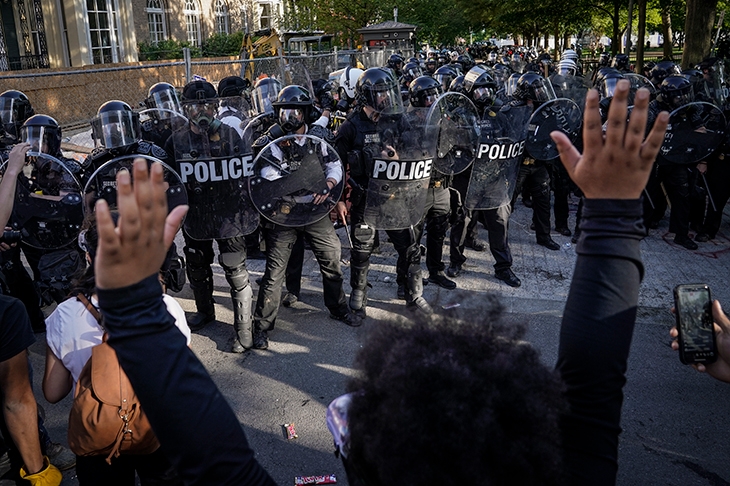In Minneapolis, where George Floyd was killed, a black entrepreneur had his bar destroyed before he even had a chance to open its doors for the first time. In Richmond, Virginia, a mob set light to a building, then blocked firefighters who were trying to save a child from the flames (-thankfully the child survived). These actions, repeated in cities all over America, are harmful in two ways: night after night, rioters are trashing their own backyard, destroying private property and putting innocent lives at risk. They are also diverting attention away from the legitimate grievances of peaceful protestors, whose efforts are far more laudable than looting.
America’s law-and-order system makes it all too easy to indict and imprison people for the most minor offences while police officers enjoy protection from their own often blatant excesses of force. The officer accused of killing Floyd by pushing his knee into his neck, even though he was already handcuffed, has been charged with murder after protests sprang up around the country to demand accountability from the Minneapolis police force. Still no charges have been brought against his colleagues, who stood around watching as Floyd’s life was snuffed out before them.
If officers are even brought to court, they are often acquitted through a device known as ‘qualified immunity’, which requires victims of police brutality to prove that the officer’s actions violated rights which have been established in previous case law by the Supreme Court. It is an invitation for clever lawyers to dream up technicalities on which to acquit police officers. In one case last November, an officer was acquitted after he allowed his police dog to bite a suspect who had sat on the ground and raised his hands: case law could only show that it was unconstitutional to set a police dog upon someone who had surrendered by lying down with his hands by his side.
Qualified immunity has helped to foster elements of recklessness all over America in police forces which, needless to say, are armed to the hilt. This has led grandstanding politicians like Tim Walz, governor of Minnesota, to denounce the ‘stain’ of ‘-fundamental, institutional racism’ on law enforcement. The figures used for this argument are, by now, all too familiar. African Americans make up 13 per cent of the country’s population but 23 per cent of the victims of police shootings. One in 100 African Americans are currently in jail, compared with one in 500 white Americans. An excessive fondness for sending minor felons to jail permeates the US justice system — zero tolerance and mandatory minimum sentences have led to jail terms being imposed indiscriminately, regardless of the circumstances — and it is black Americans who suffer the worst from it.
The police respond by saying that incarceration figures reflect crime: that African Americans make up 53 per cent of known murderers in the US and commit about 60 per cent of robberies. And more importantly, that the victims of crime are far more likely to be African American. It is in their defence that the police are deployed, with weapons to match those of the perpetrators they are pursuing. It is a complicated picture, but we know their tactics are often disproportionate and that shooting black men in the back or roughing up children for selling cigars is not to the benefit of their communities.
While black Americans especially have reason to feel aggrieved at the injustices of the US crime and punishment regime, it doesn’t help that criminal justice reform tends to get framed wholly as an issue of race. Inevitably, that draws in white supremacists and political activists who are simply spoiling for a fight. It is unfortunate, too, that incidents such as Floyd’s murder end up being seen through partisan eyes. For this, President Trump is partly to blame, with his careless and provocative tweets. But Democrats can hardly claim the political high ground. For decades, they have run the vast majority of the cities where killings by police and crime are most rife.
What America needs is a leader who can cut across partisan lines, who doesn’t resort to turning everything into photo opportunities and social media provocation, and who can see brutality for what it is. Trump isn’t going to be that leader, but neither is there an obvious figure on the Democrat side. The presumptive Democratic nominee for the presidency, Joe Biden, has a long and dubious record on criminal justice legislation that suggests a willingness to disregard principles in order to serve political expediency.
In so many ways, America remains a shining light to the world for freedom and democracy. Donald Trump attracts such open contempt from half the US population precisely because his critics know they can safely abuse him — Chinese citizens wouldn’t get away with insulting Xi Jinping in such a way, nor would such criticism be tolerated even in some European countries. On religious freedom and economic freedom, too, the US sets a proud example to the world. But when it comes to the power relationship between police and ordinary citizens, America has it badly wrong. George Floyd’s death could be a catalyst to change that.
Got something to add? Join the discussion and comment below.
Get 10 issues for just $10
Subscribe to The Spectator Australia today for the next 10 magazine issues, plus full online access, for just $10.
You might disagree with half of it, but you’ll enjoy reading all of it. Try your first month for free, then just $2 a week for the remainder of your first year.














Comments
Don't miss out
Join the conversation with other Spectator Australia readers. Subscribe to leave a comment.
SUBSCRIBEAlready a subscriber? Log in